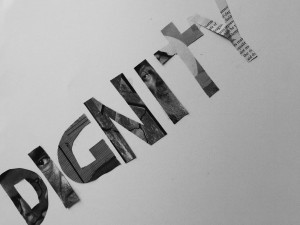Reason Five is Dignity
Nursing homes notoriously convey the opposite of dignity. Odors spread from patients’ rooms through the corridors. With advanced age and infirmity come losses of bladder and bowel control.
No show of hands but be honest. Have you ever wet your pants?
You may say I’m sharing too much information, but I’ll confess in order to make my point. While I have rarely thrown up, I have lost control in other ways more often than you’d like to know, and I can confirm that such moments have never advanced my sense of dignity.
Diarrhea, dysentery, and stress incontinence also affect characters in From the Lives We Knew, my upcoming book. If you pay attention, you’ll see recurrences of this embarrassing discomfort. I wasn’t aware of this fact until I reflected on where the virtue of dignity shows up in their stories.
By dignity, I do not mean the elevated status or rank of a “dignitary.” There may be some stuffy big shots in my stories, but not among the important characters. Also, although the characters go through some terrible experiences where it’s fitting for them to act solemn, I’m not using the word dignity to convey a grave or serious demeanor. Even the useful synonyms “poise” and “self-respect” can’t quite carry the fullness of the word “dignity.”
I think “awareness of one’s worth as a human being and of the worth of other human beings” gets closer.
War takes its toll on the characters. In war, most people are treated as less than human. People treat each other as less than human. People lose their connection to the place familiar to them. They are uprooted from the lives they knew. How can they maintain their dignity when they suffer such loss?
A young man with no resources puts up with diarrhea, a young woman running for her life wets her pants, a child regresses to bedwetting, and an old woman with a traumatic brain injury loses control of her bladder. They lose control, but have they lost their dignity altogether?
The stories of the characters in From the Lives We Knew aren’t about people who never lose their dignity, but they are about people who somehow recover their dignity. They are make-believe examples representing but a few of the millions of refugees. I hope my readers will develop a sympathetic friendship with these characters. And I hope this friendship results in a long-term interest in the human dignity of immigrants, refugees, and asylum seekers worldwide.
 Add “dignity” to the list of reasons to read and recommend From the Lives We Knew, a list which, so far, has also included “strength,” “distinctiveness,” “resourcefulness,” and “self-control,” attributes of the characters in the book’s stories.
Add “dignity” to the list of reasons to read and recommend From the Lives We Knew, a list which, so far, has also included “strength,” “distinctiveness,” “resourcefulness,” and “self-control,” attributes of the characters in the book’s stories.



